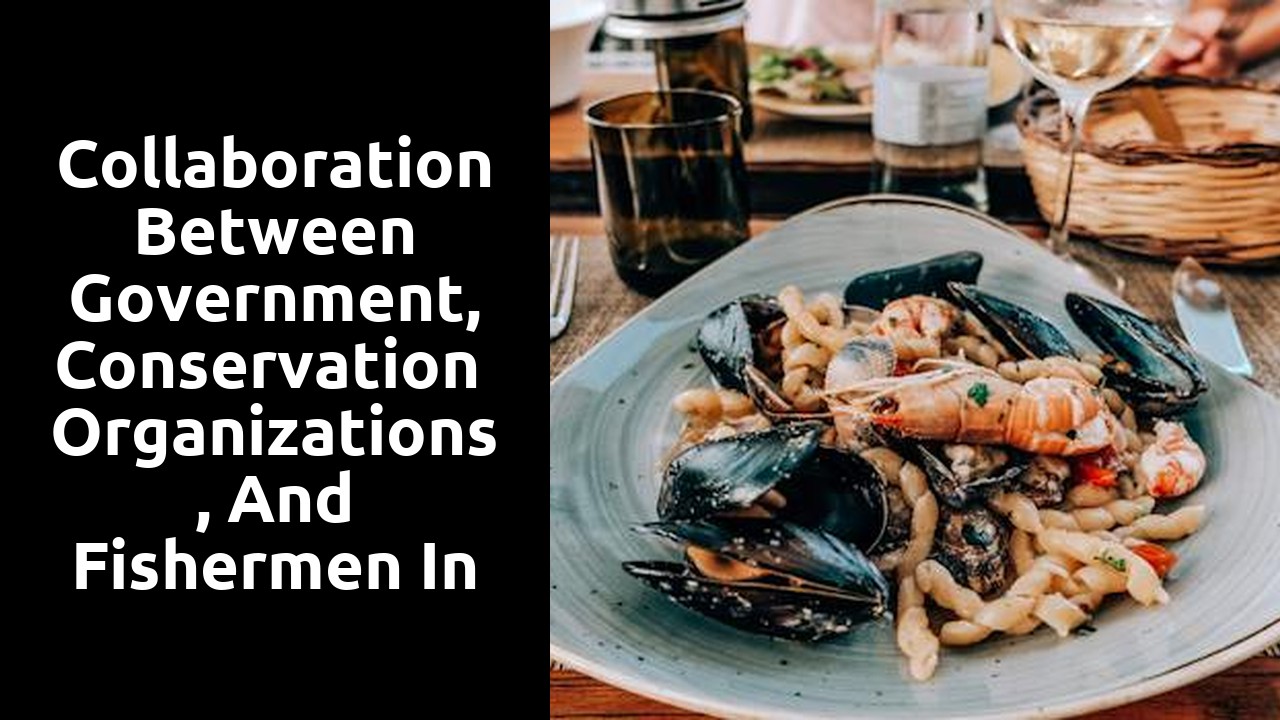Collaboration between government, conservation organizations, and fishermen in protecting marine areas for sustainable seafood

Uniting Forces: Securing Our Oceans for Future Generations
In today's rapidly changing world, it has become increasingly crucial to protect our oceans and ensure the sustainability of our seafood resources for future generations. This task cannot be accomplished by a single entity alone; it requires the collective efforts of various stakeholders, including the government, conservation organizations, and fishermen. Together, these forces are uniting with a shared commitment to securing our oceans and safeguarding the delicate marine ecosystems they contain.
One of the key benefits of uniting these forces is the power of collective action. By joining hands, these diverse groups can pool their expertise, resources, and perspectives to address the multifaceted challenges facing our oceans. The government plays a vital role in creating policies and regulations to manage and protect marine areas, while conservation organizations contribute their scientific knowledge and conservation strategies. At the same time, fishermen provide valuable insights gained from their experience on the water, ensuring that the implemented measures are practical and effective. This collaboration allows for a comprehensive approach that maximizes the chances of success in preserving our marine resources for generations to come.
The Power of Collective Action: Safeguarding Marine Ecosystems
Ensuring the future health and sustainability of our marine ecosystems requires collective action from all stakeholders involved. Conservation organizations, government bodies, and fishermen must join forces to safeguard these precious habitats. This collaborative approach is essential in addressing the complex challenges facing our oceans, from overfishing to habitat degradation.
By working together, these different groups can bring their unique expertise and resources to the table. Conservation organizations can provide scientific knowledge and research, identifying key areas that need protection and implementing strategies to preserve biodiversity. Government bodies can contribute by enacting policies and regulations that promote sustainable fishing practices and regulate fishing activities. Fishermen, on the other hand, play a crucial role in implementing these regulations on the ground and ensuring their effectiveness. With their intimate knowledge of the oceans, they can contribute valuable insights into the management of marine resources. Only through this combined effort can we truly safeguard our marine ecosystems for future generations.
Paving the Way for Sustainable Seafood: A MultiStakeholder Approach
Collaboration is the key to paving the way for sustainable seafood. When it comes to safeguarding our marine ecosystems and preserving the abundance of seafood for future generations, a multi-stakeholder approach is vital. In this approach, the government, conservation organizations, and fishermen come together, each playing their unique role in the pursuit of sustainable fishing practices.
The government's role in this collaborative effort is to establish and enforce regulations that promote responsible fishing. By implementing policies that limit overfishing, protect sensitive habitats, and promote sustainable fishing methods, the government ensures the long-term health and viability of our marine resources. Additionally, governmental organizations provide support and resources to conservationists and fishermen, enabling them to carry out their important work in preserving marine areas and ensuring the sustainability of seafood.
Nurturing Ocean Health: How Government, Conservationists, and Fishermen Join Hands
Nurturing ocean health is a collective responsibility that requires the active involvement of government, conservation organizations, and fishermen. Each stakeholder plays a crucial role in ensuring the sustainability of marine ecosystems and the preservation of seafood resources for future generations.
Government bodies have a significant impact on ocean health through policy and regulation. They have the authority to establish protected marine areas, enforce fishing restrictions, and implement sustainable practices. By working closely with conservation organizations and fishermen, governments can develop comprehensive strategies that address the complex challenges facing the world's oceans. This collaboration enables them to combine their expertise, resources, and perspectives to find innovative solutions that promote the long-term well-being of marine ecosystems.
A Shared Vision: Preserving Marine Areas for Sustainable Fishing Practices
Preserving marine areas for sustainable fishing practices requires a shared vision among government agencies, conservation organizations, and fishermen. By working together, these stakeholders can ensure the long-term health and productivity of our oceans. This shared vision involves recognizing the importance of conserving marine areas as critical habitats for fish and other marine species.
When government agencies, conservation organizations, and fishermen come together with a common goal, they can develop and implement effective strategies for preserving marine areas. This involves establishing protected areas where fishing is restricted or regulated to allow fish populations to replenish and habitats to recover. It also entails promoting sustainable fishing practices, such as using selective gear and techniques that minimize bycatch and reduce damage to the marine environment. With a shared vision of protecting marine areas for sustainable fishing practices, these stakeholders can collectively contribute to the preservation of our oceans and ensure the availability of seafood resources for future generations.
Building Bridges: Collaborating for the Conservation of Seafood Resources
Building Bridges: Collaborating for the Conservation of Seafood Resources
In order to effectively protect and conserve our valuable marine areas, there is a growing recognition that collaboration is key. Bringing together the efforts and expertise of government agencies, conservation organizations, and fishermen is proving to be a powerful approach in ensuring the sustainability of our seafood resources.
Collaboration between these different stakeholders allows for the pooling of resources, knowledge, and skills. Government agencies provide the regulatory framework and oversight to ensure that fishing practices are sustainable and adhere to conservation goals. Conservation organizations lend their expertise in research, advocacy, and the implementation of conservation measures. Fishermen, on the other hand, bring valuable insights and on-the-ground experience, contributing to the development of effective and practical solutions. Working together, these stakeholders can create a synergy that leads to more informed decision-making, improved management strategies, and ultimately, the preservation of our marine ecosystems.
Related Links
Role of technology in monitoring and enforcing regulations in marine fisheriesImportance of protecting marine areas for sustainable seafood
Best practices for designing and maintaining protected marine areas for fisheries
Strategies for effective management of protected marine areas
Challenges and solutions in protecting fisheries through marine conservation